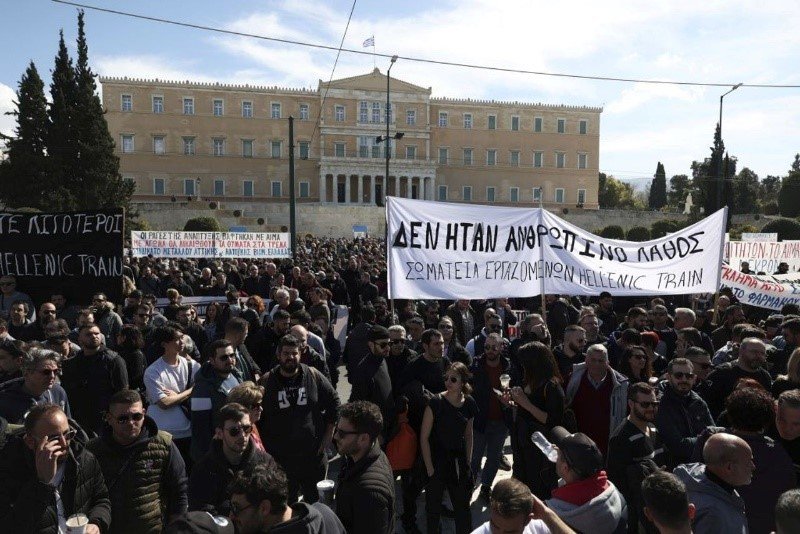Report by Kamgar Ekta Committee (KEC) correspondent

Tens of thousand of striking transport workers, students and teachers took out rallies in central Athens, the capital of Greece, and in the second largest city of Greece, Thessaloniki on 8 March 2023 to protest over Greece’s deadliest train accident.
The head-on collision of two trains on 28 February that killed 57 people has stirred public outrage over the crumbling state of the rail network. Greek rail workers have been on strike from 2 March to protest against the unsafe rail infrastructure and understaffing. Their strike has shut down of the entire rail network.
Rail workers say their demands for improvement in safety protocols have gone unheard for years and have promised to “impose safety” to ensure that a crash will not be repeated.
“We have an obligation towards our fellow humans and our colleagues who were lost in the tragic accident,” the main railway workers’ union said in a statement.
The Greek Civil Servants’ Confederation (ADEDY) joined the 24-hour nationwide strike in the public sector on 8 March. Such has been the outpouring of anger among millions of workers that ADEDY said the strike was “to demand – together with all the workers and the people – an end to the policy of privatization, and that the real responsibilities for the murderous crime of the Tempi train crash be attributed.”
Athens transport workers walked off the job in solidarity, disrupting metro, tram and bus services in the capital. Ships also remained docked at ports as Panhellenic Seamen’s Federation (PNO) participated in the strike.
Greek Primary Teachers’ Federation (DOE) too joined the strike. “It’s not the time to fall silent, it’s time to speak up and fight,” a teachers’ union said in a statement.
Rail unions say cost-cutting, staff shortages, antiquated equipment and impoverished infrastructure have plagued the network for years.
On 5 March, Sunday, too, protests took place across Greece with more than 10,000 people rallying in Athens. The main banner held by rail workers read “It wasn’t human error” as within 24 hours of the crash the government and its media backers sought to evade all responsibility for the deaths, and claimed that “human error” by the station master was primarily responsible.

A banner from the Union of Attica Metalworkers and the Greek Shipworkers’ Industry, referring to the “development” policies of successive governments in which vast portions of state industry were privatised, read, “The rails of development were drenched in blood. Through struggle the train victims will be vindicated.”
Other placards read, “Down with killer governments”, and “Their policies cost human lives”.
A banner from the Coordinating Committee of Piraeus Students warned the government, “We will become the voice of all the dead, the new generation does not forgive you.”
“We won’t stay alive by chance, we will live as we wish,” said another banner held by young protesters outside the parliament in Athens. “Murderers”, read another one.
Millions of people and workers have understood that the present and previous governments including the social democratic PASOK and SYRIZA (Coalition of the Radical Left) are responsible for creating an unsafe rail system stripped to the bone by over a decade of austerity cuts, and run with a fraction of staff required.
Greece’s rail network workforce, which stood at more than 6,000 at the onset of the austerity drive, has been brutally cut. Successive government sacked thousands of rail workers. Following its privatization in 2017 at the throwaway price of 45 million euros, the workforce was further slashed; the entire national workforce stood at just 750 last week.
Rail workers have repeatedly complained about understaffing. There are currently 133 station masters, while there should have been 411, said a union member. Staffing was at such criminally low levels that weeks before the accident, the rail company had sought to hire 73 temporary station masters for six months starting April, according to a company document.
On 7 February 2023, Greek rail workers issued a statement complaining about yet another minor accident on the network earlier this year. They warned that a more serious incident was inevitable without urgent improvements to safety systems. However, the private rail company paid no heed to the warning.
It is apparent from the experience of Greek Railway that when essential services like railway are run as commercial enterprises for profit, safety of passengers and workers is the victim.
Passengers and workers of Indian Railways must draw appropriate lessons from the experience of Greece and defeat all attempts to privatise and convert Indian Railways into commercial enterprises run for profit from an essential affordable mode of transport for the people of India.

